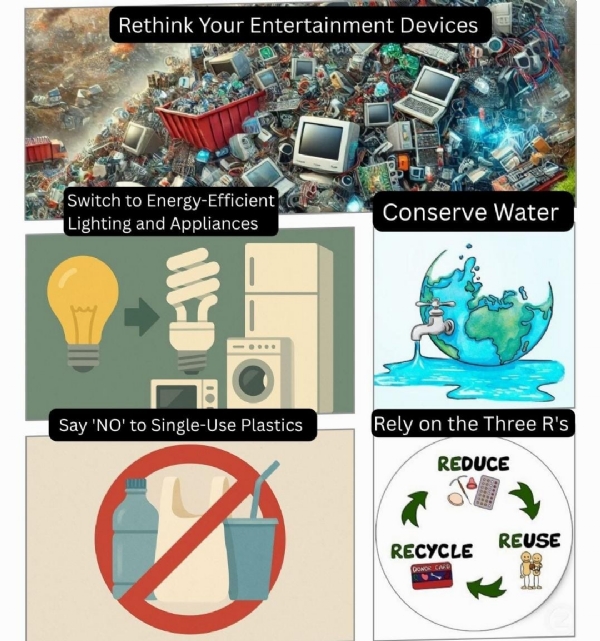
Lucknow,
5 June (HS): No action is too small when it comes to standing up for the
environment. Especially at a time when the world is facing the multidimensional
crises of pollution, biodiversity loss and climate change. Closer home,
disturbing statistics emerged in December last year when data presented in the
Rajya Sabha reported a surge in electronic waste (e-waste) over the past five
years, rising from 1.01 million metric tonnes in 2019-20 to 1.751 million
metric tonnes in 2023-24. This World Environment Day (June 5), a firm resolve
to take a few thoughtful actions can help us contribute towards incremental
change.
Here
are five tips from Sushil Motwani (Founder of Aytexcel Pvt. Ltd and the
official India representative of Formovie) to make your home greener and
healthier:
Rethink
Your Entertainment Devices: Did you know that large screen TVs, when discarded
improperly, can harm the environment due to hazardous materials like mercury?
Older models have toxic substances like lead that can contaminate soil and
water and put ecosystems at risk. Not all components of TVs can be recycled
easily either and one way to proactively manage e-waste is to invest in
greener, eco-sensitive devices and to responsibly dispose and recycle old
electronics. New age projectors, especially those using LED or laser light
sources, offer more green benefits in comparison. For instance, projectors from
Formovie—like the Cinema Edge, Theatre Premium, Xming Episode One, and Page
One— boast lower energy consumption and are better for eye health as they
minimise blue light exposure. Modern projectors often use eco-friendly
materials as well as green manufacturing processes, reducing carbon footprint
substantially. They also generate less heat and require minimal maintenance.
Switch
to Energy-Efficient Lighting and Appliances: Energy-efficient lighting and
appliances can reduce not only energy bills but also minimise carbon footprint.
LED bulbs and Compact Fluorescent Lamps (CFLs) consume less energy than
traditional incandescent bulbs and last much longer. Electrical appliances with
BEE Star Label indicate energy efficiency standards. Choose dishwashers and
washing machines that use lesser quantities of water. It is also important that
we unplug devices when they are not in use. Solar photovoltaic panels are a
practical choice too as they can cater to different energy needs in our homes.
Say
'No' to Single-Use Plastics: Over three years ago, India imposed a nationwide
ban on single-use plastics (SUP) but is still the world’s fifth-largest
generator of plastic waste, producing approximately 3.5 million tonnes every
year. A large number of people continue to rely on plastic bags to carry
groceries. The only way to prevent straws, disposable cutlery, water bottles
and multilayered packaging from ending up in landfills, rivers and oceans, is
to refuse single-use plastics. Plastics have a far reaching impact on the
environment and have infiltrated even our food chain. By carrying our own
shopping bags, cutlery, steel bottles and coffee mugs on the go, we can cut
down on the amount of plastic we personally generate on a daily basis.
Conserve Water: ater is a finite resource so
let us be smart with water usage and consumption. And because every drop of
water is precious, we must fix leaking taps, use water-efficient faucets as
well as showerheads. We could also explore rainwater harvesting methods and
reuse water from rinsing vegetables etc to drench our plants. Any water that
has been used at home (except water from toilets), can be reused in the garden.
It is also wise to water your lawn only when needed with a deep-soak. This
entails watering the lawn long enough for water to reach the roots where it is
most needed. Watering the plants during the cooler parts of the day is better
as the moisture will not evaporate in the heat.
Rely
On the Three R's: The simple tenets of 'Reduce, Reuse, and Recycle' can
transform our resource consumption patterns and the way we generate waste. We
can consciously choose to reduce our consumption of fast fashion, minimise online
shopping and buy only essential things with less packaging. We can reuse old
objects by tweaking their usage. Ideas like recycling denim to make tote bags,
using vintage fabrics to make clothing or wall panels, repairing electronics
rather than throwing them, upcycling furniture, turning bottles into lamps are
gaining traction today and for good reason. Finding new ways to use old things
that would otherwise be discarded, is good for the environment. Recycling waste
materials creatively is the need of the hour and can reduce the impact of human
activities on the environment.
Hindusthan Samachar / Abhishek Awasthi





